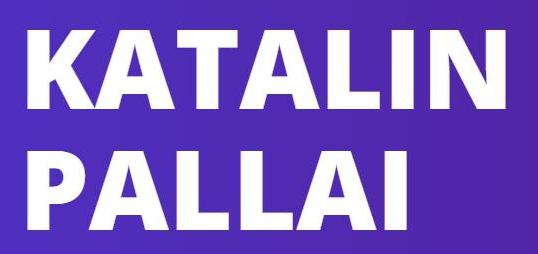During the 20+ years of my teaching and training experience I have designed many courses on local government leadership and strategy, negotiation and conflict resolution, cooperation and communication, and on local governance. I have mostly worked in highly diverse and international environment – participants of some of my courses came from many different countries and continents.
All my training courses (even the ones presented at Universities) are based on the experimental learning method and are run in a highly interactive manner. Participants get involved in analysis and discussion of cases, individual and group reflections, debates and problem solving exercises. During the debriefing of the activities we not only systematically analyze what happened and evaluate the work process, I also introduce basic elements of a systematic conceptual framework that can help understanding situations better and developing competencies to solve them. During the courses I also build in elements for self-assessment and reflection and for the development of individual plans for further developing competencies.
Read external evaluation reports of my work
EllenGPeerReviewTraining10-12Dec13 short Vasilache peer review report
Intergity management trainings, Hungary
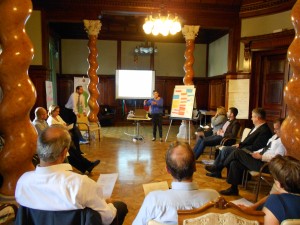 In the frame of a large EU financed project on Corruption Prevention, implemented in cooperation between the Hungarian National University of Public Service and the Ministry of Public Administration, I was commissioned to develop training curricula for integrity advisors and civil servants. On the basis of the curricula the largest further education program of the Hungarian public administration is being implemented: more than 800 senior civil servants and 8500 civil servants are educated on corruption prevention and on approaches to strengthen organizational integrity. I have also presented the training for a group of state secretaries, deputy state secretaries and government commissioners. On the basis of the method I also developed a course on integrity management for MA level university education. From 2014 the course is also part of the obligatory curriculum at the National University of Public Service and introduced on other Hungarian universities as well.
In the frame of a large EU financed project on Corruption Prevention, implemented in cooperation between the Hungarian National University of Public Service and the Ministry of Public Administration, I was commissioned to develop training curricula for integrity advisors and civil servants. On the basis of the curricula the largest further education program of the Hungarian public administration is being implemented: more than 800 senior civil servants and 8500 civil servants are educated on corruption prevention and on approaches to strengthen organizational integrity. I have also presented the training for a group of state secretaries, deputy state secretaries and government commissioners. On the basis of the method I also developed a course on integrity management for MA level university education. From 2014 the course is also part of the obligatory curriculum at the National University of Public Service and introduced on other Hungarian universities as well.
In 2014 in the frame of the life-long education program for civil servants I designed a one day long Public Ethics training methodology for staff members and a 2,5 days Integrity management curriculum for public sector leaders and trained the trainers for the trainings. Due to the good reputation of the previous integrity trainings presented during the earlier mentioned EU sponsored project, a large number enrolled already in the first months. According the forecast by the end of 2014 15% of the Hungarian civil service will be trained by my methodologies.
Local Leadership and community management trainings
Leadership Academy of the Council of Europe
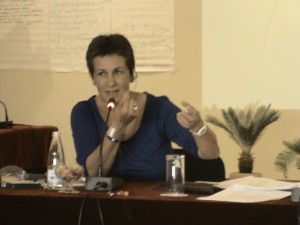 3(4) times 3 days trainings that are combined with activities designed for the implementation by participants alone or in peer pairs in-between the training modules. The target group is local leaders (Mayors, politicians and leaders in the administration) – the best is when more people take part from one locality, as they can later create a team for change. Content elements cover: concepts and competencies of modern leadership, systematic analysis of leadership challenges in municipalities, organizational development, strategic approaches and relations with stakeholders. More detailed content presented by the mind maps attached to the end of the file.
3(4) times 3 days trainings that are combined with activities designed for the implementation by participants alone or in peer pairs in-between the training modules. The target group is local leaders (Mayors, politicians and leaders in the administration) – the best is when more people take part from one locality, as they can later create a team for change. Content elements cover: concepts and competencies of modern leadership, systematic analysis of leadership challenges in municipalities, organizational development, strategic approaches and relations with stakeholders. More detailed content presented by the mind maps attached to the end of the file.
Councilor Training
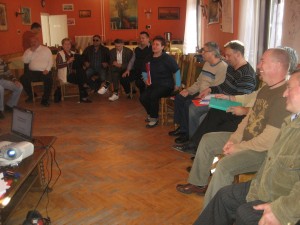 2-3 day training organized for newly elected local councils – possibly for the whole council or most of its members. Training components assist the participants to acquire the knowledge, the appropriate attitude and the necessary competencies that are required to foster decentralization and make municipal administration and management a success. The interactive method of the training is adapted to develop personal competencies, in-group relations and develop some shared assumptions for the future work. Conceptual elements covered include: local democracy and sustainable local development and management, accountability, principles of decision making, planning, participation and communication, financial management, organizational management, public service management.
2-3 day training organized for newly elected local councils – possibly for the whole council or most of its members. Training components assist the participants to acquire the knowledge, the appropriate attitude and the necessary competencies that are required to foster decentralization and make municipal administration and management a success. The interactive method of the training is adapted to develop personal competencies, in-group relations and develop some shared assumptions for the future work. Conceptual elements covered include: local democracy and sustainable local development and management, accountability, principles of decision making, planning, participation and communication, financial management, organizational management, public service management.
Local Community Management for active community groups and members
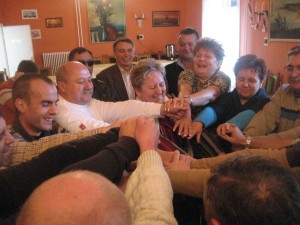 On the way to more open governance municipalities may recognize that it is better to collaborate with (lay) community leaders who can understand the principles of local governance and have an overall picture about the operation of the local government. The course could offer learning for community leaders to become more constructive external partners and to improve their leadership competencies as well. In ideal case potential lay community leaders of 2-3 locality (5-8 from each) could be trained together, as working together during the training would contribute to the ‘forming’ and ‘norming’ of local community groups. (1 LG staff may also participate) The course material could be developed through the adaptation of the Councilor Training material, adding some elements from the Leadership Academy and my Consensus Building courses.
On the way to more open governance municipalities may recognize that it is better to collaborate with (lay) community leaders who can understand the principles of local governance and have an overall picture about the operation of the local government. The course could offer learning for community leaders to become more constructive external partners and to improve their leadership competencies as well. In ideal case potential lay community leaders of 2-3 locality (5-8 from each) could be trained together, as working together during the training would contribute to the ‘forming’ and ‘norming’ of local community groups. (1 LG staff may also participate) The course material could be developed through the adaptation of the Councilor Training material, adding some elements from the Leadership Academy and my Consensus Building courses.
Governance and participation training courses
Some ten years ago my PhD dissertation was based on the analysis of public sector paradigms (traditional, managerial, governance). After the dissertation I developed courses where I used the conceptual framework developed for the dissertation for practical analytical exercises of local government policies and practices. Such exercises help local decision makers to better understand the hidden assumptions, logic and explanations of different personal and institutional routines and practices. Becoming more conscious of the paradigms has greatly helped leaders to capture and name differences, identify needed changes and develop approaches more consistent with their own values and goals. The key sources of my conceptual framework seem to be the same as the one of KDZ, but in the applications for the analysis of participatory practices there are some differences, probably due to the difference in application contexts. (i.e. difference in the condition and imminent challenges of local governments in the two countries)
Multi-ethnic Community Management
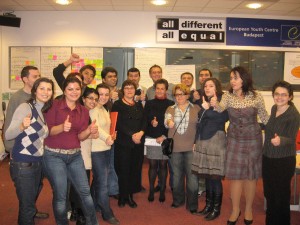 Between 2005 and 2011 I worked for 7 years as faculty in the frame of this program established by the Open Society Institute and had the opportunity to develop and teach courses with leading experts of minority rights and other fields of minority studies. The courses focused on local political opportunities (and limitations) in the accommodation of the needs and aspirations of ethno cultural minorities. The course development was an interdisciplinary work where my role was to bring in the knowledge of local governance, dispute resolution and field experience from local democracy building. During the course development I worked with the minority experts to develop an integrated conceptual framework and experience based teaching material to discuss existing local multicultural policies and practices and to identify the major issues and dilemmas in the local management of ethnocultural diversity. Each course was presented to a widely international audience, including participants from Europe, Africa, Asia. The courses I designed and led with a co-trainer were: Minority rights and local governance; Power sharing in Multi-ethnic Communities; Public Policy Process in Multi-ethnic Communities; Service delivery in Multi-ethnic Communities; Managing Conflict and Urban Development in Multi-ethnic Communities.
Between 2005 and 2011 I worked for 7 years as faculty in the frame of this program established by the Open Society Institute and had the opportunity to develop and teach courses with leading experts of minority rights and other fields of minority studies. The courses focused on local political opportunities (and limitations) in the accommodation of the needs and aspirations of ethno cultural minorities. The course development was an interdisciplinary work where my role was to bring in the knowledge of local governance, dispute resolution and field experience from local democracy building. During the course development I worked with the minority experts to develop an integrated conceptual framework and experience based teaching material to discuss existing local multicultural policies and practices and to identify the major issues and dilemmas in the local management of ethnocultural diversity. Each course was presented to a widely international audience, including participants from Europe, Africa, Asia. The courses I designed and led with a co-trainer were: Minority rights and local governance; Power sharing in Multi-ethnic Communities; Public Policy Process in Multi-ethnic Communities; Service delivery in Multi-ethnic Communities; Managing Conflict and Urban Development in Multi-ethnic Communities.
Negotiation and conflict resolution trainings
Introduction to negotiation and conflict management
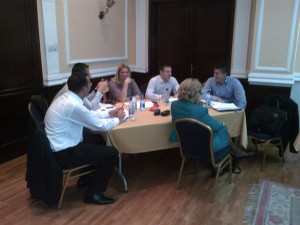 1 to 4 days training that covers basic concepts and tools for negotiation, conflict analysis and management; supports participants self-awareness in general and in conflict situations; and offers some experience in constructive conflict resolution. During the trainings participants experience various negotiation and conflict situations as stakeholders, and are encouraged to use negotiation different techniques and tactics. The experience of own and group behavior and dynamics create the basis for the understanding of conflict situations, their dynamics and their constructive management. The concepts covered include: ZOPA, BATNA, competitive, investigative and collaborative negotiation, value creating and claiming strategies and tactics, role of third parties…
1 to 4 days training that covers basic concepts and tools for negotiation, conflict analysis and management; supports participants self-awareness in general and in conflict situations; and offers some experience in constructive conflict resolution. During the trainings participants experience various negotiation and conflict situations as stakeholders, and are encouraged to use negotiation different techniques and tactics. The experience of own and group behavior and dynamics create the basis for the understanding of conflict situations, their dynamics and their constructive management. The concepts covered include: ZOPA, BATNA, competitive, investigative and collaborative negotiation, value creating and claiming strategies and tactics, role of third parties…
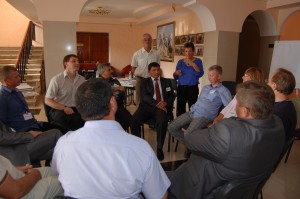 Multi-party conflict management
Multi-party conflict management
1 to 4 days training that covers basic concepts of and methods for conflict analysis and management and the management of multi-stakeholder processes. During the trainings participants experience various negotiation and conflict situations as stakeholders, and use techniques and tactics to resolve them. The experience of own and group behavior and dynamics create the basis for the understanding of multi-party conflict situations, their dynamics and their constructive management. The concepts covered include: conflict and stakeholder analysis, conflict escalation and de-escalation process, convening and representation, facilitation of group problem solving, linkages of conflict resolution to formal decision making.
Collaborative negotiation and conflict resolution for leaders
The course is part of the Leadership Education program for public sector leaders, developed within the frame of an EU sponsored project in the Public Leadership Education Centre. It offers introduction and practice to the Harvard method for negotiation, and to methods adapted to deal with emotionally charged conflicts. It teaches basic concepts that help to identify, understand and map causes of conflicts, and presents the principles and method of collaborative negotiation and conflict management. The skill and behavioural components offer opportunity to collect personal experiences and practice problem solving and conflict resolution methods in simulations designed on typical situations in public sector. The course is held in a training format that is based on experimental teaching methodology. The students participate in interactive exercises, individual and group reflections and debates.
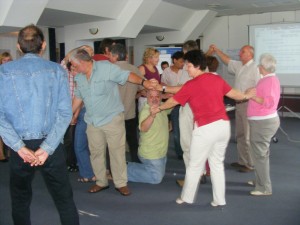 Communication and cooperation trainings
Communication and cooperation trainings
Communication, cooperation and teamwork training
Depending on the need and demand of the target group I design various training programs that lead participants through various inter-personal and inter-group exercises. After they have experienced the situations and the outcomes of their selected strategies, we reflect, discuss and internalize the learning. During the exercises participants learn about communication and experiment with different communication modes and tools; choose between competitive and cooperative strategies for problem solving; reflect on their own personal characteristics and competencies; and on the conditions that can render group work effective and fulfilling. Based on the various learning experiences, till the end of the training, participants can understand how teams form and work together, and how can they become effective members or leaders of teamwork.
Consensus building
1 to 4 days training that offers an introduction to cooperation and consensus building techniques for problem solving, planning and conflict management. Participants experience and reflect on the possibilities, obstacles and traps of cooperation among individuals and groups; learn basic concepts of problem solving, planning and conflict management processes, and get acquainted with process design, techniques and facilitation tools of consensus building.
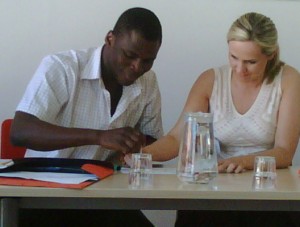 Inter-ethnic and inter-cultural trainings
Inter-ethnic and inter-cultural trainings
Multi-ethnic Community Management Program
Between 2005 and 2011 I worked for 7 years as faculty in the frame of this program established by the Open Society Institute and had the opportunity to develop and teach courses with leading experts of minority rights and other fields of minority studies. The courses focused on local political opportunities (and limitations) in the accommodation of the needs and aspirations of ethno cultural minorities. The course development was an interdisciplinary work where my role was to bring in the knowledge of local governance, dispute resolution and field experience from local democracy building. During the course development I worked with the minority experts to develop an integrated conceptual framework and experience based teaching material to discuss existing local multicultural policies and practices and to identify the major issues and dilemmas in the local management of ethnocultural diversity. Each course was presented to a widely international audience, including participants from Europe, Africa, Asia. The courses I designed and led with a co-trainer were: Minority rights and local governance; Power sharing in Multi-ethnic Communities; Public Policy Process in Multi-ethnic Communities; Service delivery in Multi-ethnic Communities; Managing Conflict and Urban Development in Multi-ethnic Communities.
Multiculturalism
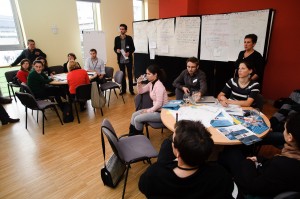 The course is part of the Masters in International Public Management curriculum at the Hungarian National University of Public Service, I developed it both in English and Hungarian. Its aim is to develop students’ intercultural competencies, with focus on knowledge, skills and behaviors necessary to deal with clients and partners of public service. The knowledge components enhance students’ capacity to map and understand different assumptions, values and mind sets of clients, and introduce students to key conceptual frameworks of multiculturalism and to the principles of collaborative negotiation and non-violent communication. The skill and behavioral components offer opportunity to collect personal experiences and practice problem solving and conflict resolution methods in simulated multicultural and multi-ethnic situations. The course is held in a training format that is based on experimental teaching methodology. The students participate in interactive exercises, individual and group reflections and debates. They experience multicultural situations and learn problem solving and conflict resolution techniques. The teacher acts as facilitator during the exercises, and after the exercise debriefing, builds short conceptual presentations on the conclusions reached by the group.
The course is part of the Masters in International Public Management curriculum at the Hungarian National University of Public Service, I developed it both in English and Hungarian. Its aim is to develop students’ intercultural competencies, with focus on knowledge, skills and behaviors necessary to deal with clients and partners of public service. The knowledge components enhance students’ capacity to map and understand different assumptions, values and mind sets of clients, and introduce students to key conceptual frameworks of multiculturalism and to the principles of collaborative negotiation and non-violent communication. The skill and behavioral components offer opportunity to collect personal experiences and practice problem solving and conflict resolution methods in simulated multicultural and multi-ethnic situations. The course is held in a training format that is based on experimental teaching methodology. The students participate in interactive exercises, individual and group reflections and debates. They experience multicultural situations and learn problem solving and conflict resolution techniques. The teacher acts as facilitator during the exercises, and after the exercise debriefing, builds short conceptual presentations on the conclusions reached by the group.
Inter-cultural/inter-ethnic communication, cooperation and conflict resolution trainings
I have spent 20+ years working with local government and civil society stakeholders in numerous countries and cultures including Hungarian, Eastern- and South-East European, American, British, and currently I live in Austria. My first hand experience, underpinned with academic studies, gives the in depth understanding of the difference in cultural attitudes and codes, and the challenges of working across cultures. My expertise is in working with local governments and various other stakeholders on specific local issues, like public participation, local service provision and conflict resolution in highly diverse and multi-ethnic communities.
The aim of the course is to enhance participants’ intercultural awareness, and strengthen their skills and competence to work effectively with partners from other cultures. During the course through different exercises (like, story telling, discussions, role plays, and individual and group reflections) participants understand how cultural values and attitudes affect intercultural/inter-ethnic communication and interaction. They also learn key concepts related to identity formation and to the political and policy options for accommodating the needs and aspirations of diverse identity groups. From case studies they see models and strategies for more effective intercultural communication, for improved working across cultures, and for resolving intercultural misunderstandings and conflicts. The result can be better understanding of clients, awareness and appreciation of cultural difference and reduced conflict in the community.
Such courses work best when participants are as diverse, as the communities they live in. Facilitated work in the safe environment of the training can help minorities and immigrants to understand the relationship between their own culture and the dominant culture, and majority members to understand the specific challenges of their own and their counterparts’ in developing constructive and fulfilling relations. In such environments while participants develop their personal intercultural competence, they can also develop relations and ideas that can contribute to developing the intercultural competence of the organization, to enhance the level of services provided and decrease frustration and conflict among stakeholders.
